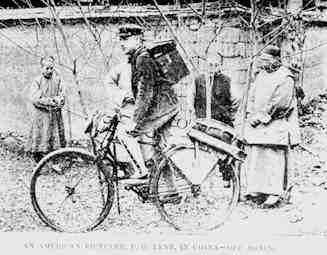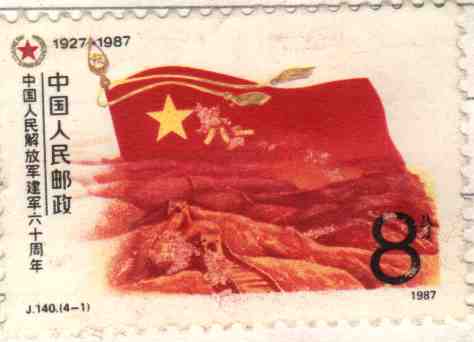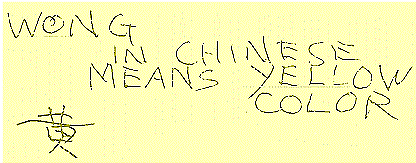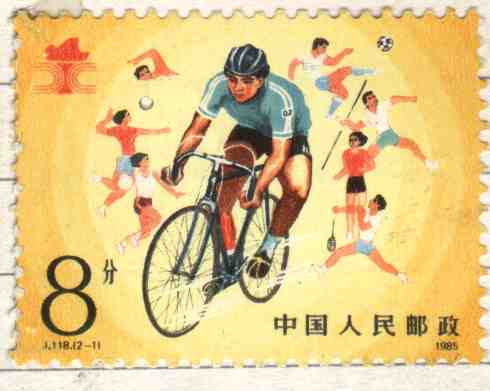
Spoke Notes
China in October
Copyright © Peter Snow Cao, 1998.
Back to Travelogue Index
Skip to: Travelogue Index | China in October | November in Yangshou | Road to Taijang | Killing in Kaili | Grinding in Guiyang | Out in the Boonies | Land of Eternal Spring | Dali in December | Tiger Leaping Gorge | Doing Dali Again | Train to Guangzhou | Goodbye China!

"CHINA! We made it!" We shouted after we caught our breath. The country was full of bicycles, and we were thrilled to be there. A new language to learn. We knew five Chinese words between us, but that didn’t matter. As far as we were concerned, we were free in Red China.
Zhuhai
At first village after the border, hunger set in and we stopped at a bakery to see if we could get something to eat. A moment later, we were surrounded by about 15 middle-aged women, shaking money in our faces. "Change money, change money", they cried their mantra. We were totally unprepared for this. Having heard stories from travelers in Hong Kong about arrests, and confiscation, we were in no hurry to get thrown out the hour after we got in. However, we were curious as to what the black market rate was, for future reference.
| "It was
Mao's favorite color" A bank employee on my observation that the 50 FEC note was red. |
A woman bystander who spoke some English was there and translated the bidding process for us. First they wanted Hong Kong dollars, but we already changed ours, not realizing they would be valuable across the border. Then they wanted to trade for US dollars, but we weren’t interested. They said they wanted FEC, the Chinese Foreign Exchange Certificates issued to foreigners to spend in fancy hotels and Friendship Stores. One woman offered 100 Chinese yuan for 100 FEC. Another said 105 yuan for 100 FEC. Another said 110 yuan for 100 FEC. Our translator told us the going rate was really 120. We never got that from the crowd, so we left with no trade, and more than a little relived.
First impressions were wonder and amazement. China seemed to be much more advanced than I expected. There were lots of vehicles, but also bicycles everywhere. Lovely ladies riding with long flowing hair dressed to the hilt riding in mini-skirts and high heels. Many women in southern China wore white cotton wide-brimmed hats to protect them from the sun. So many people, everywhere. Walking, riding bicycles, working on construction. The buildings under construction were enveloped in a rattan web of bamboo.

Zhongshan
Our first evening in China, we were eating at a restaurant and were approached by a gentleman in his 40’s. "Hello!" he yelled. "Where do you come from!" Taken aback by his loud voice we told him. Mr. Wong could only talk at FULL VOLUME, in spite of our efforts to lower his voice. He asked if he could practice his English. We readily agreed. He then proceeded to quiz us in great detail about our lives. We also learned about a number of Chinese customs. He told us that Chinese don’t talk about the age of their children, and they don’t celebrate their birthday until they are 61. He also said that when someone pours tea for another, the receiver should show his or her appreciation by tapping his or her index finger on the table. This was a custom started centuries ago when the emperor went traveling in disguise as a servant to protect his life. So when his subjects were receiving tea from the emperor they would show their appreciation by tapping on the table.
Mr. Wong told us that to face west and south was lucky in Chinese culture as well as the time 10 o’clock. He also wrote our names in Chinese for us. I was anxious to get a "chop" with my name on it to replace the one I had made in Indonesia that was stolen in Korea. It was also useful to have a Chinese name for filling out the hotel registration forms.
The next day as we were leaving our hotel, Mr. Wong met us with his bicycle. We wondered if it was coincidental, or if he had followed us home after dinner last night and then waited for us this morning. He was excited to see us and rode with us for about five kilometers. I gave him some stamps from Germany. Mr. Wong then offered me a beautiful jade bracelet. I had heard previously that whenever someone offers you something in China that you should refuse three times. If the person really wants you to have it, they will be persistent until you accept. I politely refused his jade. He quickly put it away and appeared relieved. At the end, we took some pictures and I asked him to sign my diary. He writes like he talks, IN BIG BLOCK LETTERS.

Guangzhou (Canton)
I met a young man who said he was a student learning English so he could be an interpreter. He, like Mr. Wong, wanted to practice his English and asked if he could show me around. I told him sure, I was just going to the bookstore to look for a map. We walked around and talked about many things. At the point of departure, he asked me for "a little money". I asked him how much a "little" was. He said 40 RMB (about 3 day’s wages for the average worker). At this point I realized that his offer to practice English was only a pretext for trying to get money from me. I got angry and told him to forget it. If he wanted to charge for his services as a guide, he should have told me at the beginning. Then I realized that, like many places, not everyone is what they seem to be.
China continues to enchant us, even during difficult times. While riding north of Guangzhou, Rainer got another flat tire. We happened to be near one of the few gas stations, so we went there to fix it. There two young Chinese women attendants working there, and when they saw what the problem was they proceeded to make Rainer as comfortable as possible. They brought him a chair to sit on and later some tea to drink while he was repairing his tire. It was the best service station in China.
Rainer is an avid chess player and has found that many men enjoy playing Chinese chess. So Rainer bought a Chinese chess set and whips it out whenever he gets a chance usually at meal times. He is slowly learning the rules. While Rainer plays chess, I try writing in my diary. It is not easy when there are 10 to 20 people standing around me watching me write. This will take some getting used to.

Sihai
One night while walking around town after dinner, we passed a place with loud disco music shrieking from the speakers into the street. The woman owner motioned for Rainer to come inside, handed him the microphone and invited him to sing. He jumped at the opportunity and sang "Maria" from "The West-Side Story". Rainer’s voice attracted a small crowd of about 30 people watching him sing. Then the owner put on some disco music and invited us to dance. I declined and Rainer hesitated for a few moments. I guess he must have liked the music because in a few seconds, he went at it whole hog, like John Travolta in "Saturday Night Fever". As he was dancing, the crowd grew and grew until it appeared to be more than 200 people watching. The song was about 10 minutes long and Rainer kept at it for the entire length during which he got plenty of applause and catcalls.
It is interesting that when we are trying to get some help and we don’t understand what they are saying, the people we meet will then write what they are trying to tell us, in Chinese, of course. I guess they figure that we must be like Chinese in other parts of the country who speak a different dialect. If we don’t understand what they say, then we should be able to read it.
Other impressions: The Chinese people we have met so far are much like the Thais and Indonesians, very friendly – quick to say hello, smile and give us a thumb’s-up sign.
While cycling in northern Guangdong Province, Rainer and I were in an area of small villages when it got dark. We stopped and found a tiny four-room inn with only the basics. We were getting settled down in our room about to go to dinner. Rainer had gone to take a shower, when the hotel room door flew open and six men dressed in green police uniforms with red strips down the pants legs, the hotel manager and a young man dressed in street clothes. They were smiling and saying, "Nee how". Everyone sat down on the beds and then got down to business. The young man spoke some English and told us he was a student and was asked by the Public Security Bureau (PSB) to be an interpreter. The PSB guys wanted to know where we came from, where we were going, if I had been on a bus, if I knew Chinese, or if I was a student. As I answered the questions, their expressions became more and more grim. The PSB officer in charge was giving the hotel manager hell, or so it seemed to me. The inquisition never really turned ugly, but it was clear they were not happy to see me there. When Rainer returned, he appeared looking very bewildered. The PSB guys wanted to escort us to dinner. We left the hotel and were shown to a restaurant joined by our translator’s teacher for the first part of the meal. During the second half, the "guy with the gun" joined us. During the entire meal the front of the restaurant was packed with 40 to 50 kids. It seemed like every kid in town was there. The restaurant owner would shoo the kids outside every couple of minutes, only to have them creep back in. After dinner we were escorted back to our room. Our first brush with the authorities ended fairly well.
| "On dealing
with the PSB: when you are right, smile; when you are wrong, smile even more." Jonathan, a cyclist from the UK crossing China |
After we returned, we got talking about the reactions we have been getting going through the smaller villages. It occurred to us that the Chinese government might have a point in wanting foreigners to stay in the big tourist hotels. No doubt our presence has reduced the productivity because wherever we go people stop what they are doing to watch.
The area we are riding through appears to be a major producer of bamboo. Everywhere bamboo was being sorted into teepee-style bundles. There were also a large number of people making gravel for highway construction using a small hammer. Each person had two large piles of stones; one made up of large stones and the other of the smaller crushed stones.
Cycling through China this way has taught me what it really means to travel. To share experiences with the people in foreign lands and finding some way to relate to them through words, expressions, games or whatever. Rainer said that he found playing chess a wonderful way to get to know people.
It seems like the further we get from the big cities, the better the experiences get. Rainer was not feeling well and decided to take a bus to the next place where we planned to stay. Near the border with Guangxi Province I stopped to get something to eat at a small restaurant. As I was finishing my lunch, I met a boy from the local middle school who said he wanted me to meet his English teacher. I agreed and followed him across a narrow wooden bridge with no railings to his school. There I met the two local English teachers, Frank and Liang. They were very excited to see me. They invited me in gave me the best chair, got me a soft drink and we talked.
They wanted me to stay for the night, but I told them I was planning on meeting my friend in another town about 40 km up the road. So they walked me out to the road with about 50 students in tow. I started to get on my bike, but it was clear that they wanted to talk more, so I walked with them into town. When we got to town, a truck rolled up behind us with Rainer in the cab and his bicycle in the back. He had gotten a ride from a truck driver arranged by the people in the previous town. The truck had to be repaired here, so there was going to be some delay for Rainer. Frank and Liang asked us to stay and return to the school to talk some more. Rainer played a few games of Chinese chess and we met a steady stream of teachers. Later Frank got word that we had been invited to as the guests of the Chairman of the People’s Committee and the Mayor to spend the night and have dinner with them. This was all so overwhelming; we were both surprised to find so much hospitality. We were told that we were the first Western tourists to visit their town.
We walked back into town to meet the Chairman, a stereotypical looking Communist Party leader if there ever was one. He was about 60 years old, gray-streaked black hair receding hair line, high forehead, bushy eyebrows, round face, and a smug look about him. The mayor was younger also with a round face, and seemed to fit the mold. We met in their office and had tea and oranges. Frank and Liang acted as interpreters. The Chairman welcomed us to their town and invited us dinner and also to spend the night in the government hotel. What could we say except yes? We were escorted to our room and situated by a very pretty young woman with beautiful eyes and a great smile. After a quick shower we sat and talked a while longer before dinner.
Dinner was more like a feast. Numerous dishes were piled on the table. There was chicken soup, chicken and mushrooms, fish, vegetables of all types, fried egg soup. Bread, non-alcoholic beer and more. This was incredible. We were being treated like royalty. There was plenty of toasting and compliments being vaulted across the table like a ping pong match. At the end of the meal the Chairman asked us to send other travelers to their town. Both the room and the meals, including breakfast the next day, were presented as gifts from the Chinese government to us, their honored foreign guests. The whole experience was very intense and tiring, particularly for Liang and Frank, who had to interpret for us. Now I will have to get used to be being back in the real world where I am just an oddity rather than royalty.
"Welcome to China" Parting words of the PSB officer who arrested us. |
It is never a dull day traveling in China. The next day was no exception. After a rather hard ride on some paved and unpaved roads we entered Guangxi Province. A man in green on a motorcycle helped Rainer up a hill and then escorted us as we rode. At a village he stopped and we didn’t see him again. It was almost dark when we arrived in at the town where we planned on spending the night. We asked around for a hotel and were directed to another small inn apparently used by the PSB. After a 30-minute wait we were shown a room. Rainer left to take a shower. A few minutes later there was a knock on the door and a man in green came in. Damn, another interrogation, but this time with no interpreter. After while of him writing things down and me saying I don’t understand, he made it clear that we could not spend the night there and would have to ride 10 km in the dark to the next town. I made some pleading gestures and tried to communicate that we were tired. After a while he said we could stay. Then I pulled out my phrasebook. He found that very interesting. Rainer returned from his shower and the man in green pointed to the phrases, "Welcome to China", "Hope you enjoy yourself", " Have a good trip", and "Terrific". It was nice to see he had a sense of humor.
While we were waiting to have dinner, a second group of PSB men in green arrived, and this time one of the officers could speak some English. They asked to see our passports, which they scrutinized carefully. We were told what we had already figured out by now, that we were in an area closed to foreigners and that we would be unable to ride our bikes except in open cities. They told us we could spend the night here and we would have to leave tomorrow at 8 am and ride eight kilometers to the next town where we would meet them at the bus station. We would have to take a bus to Yangshou. We told the PSB that we didn’t know we were in a closed area because there were no signs, and there is no one to tell us when we asked for the information.
The next day at the bus station one of the PSB officer’s parting words to us as we were getting on the bus, "Welcome to China".
Skip to: Travelogue Index | Introduction | China in October | November in Yangshou | Road to Taijang | Killing in Kaili | Grinding in Guiyang | Out in the Boonies | Land of Eternal Spring | Dali in December | Tiger Leaping Gorge | Doing Dali Again | Train to Guangzhou | Goodbye China!
Bike China Adventures
Main Page | Guided Tours | Maps | Tour Planner | Photo Gallery | Cycling Travelogues
Favorite Quotes | FAQ | General Info | Links | About Us | Contact Us
Copyright ©© Bike China Adventures, 1998-2004. All rights reserved.